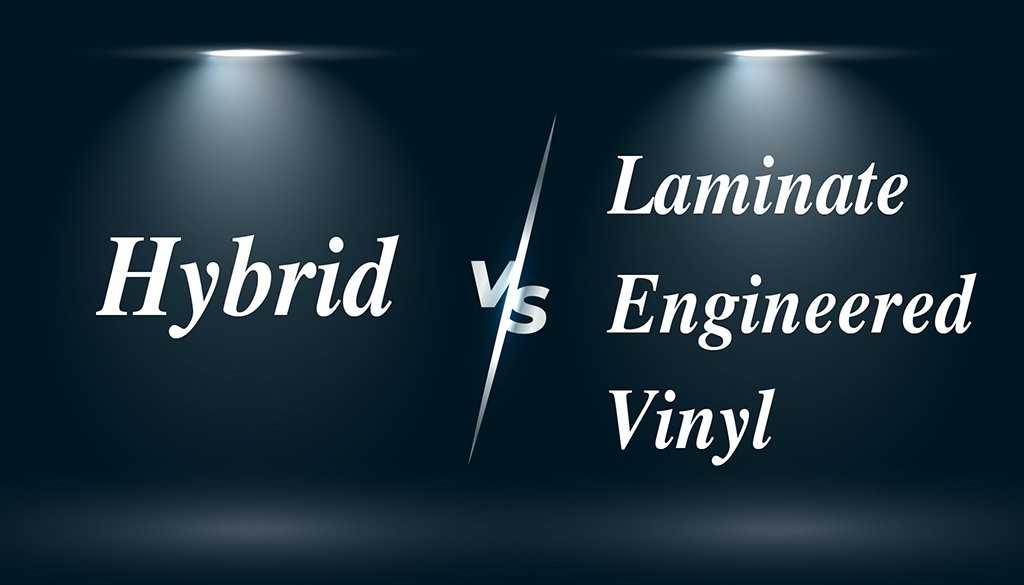Hybrid Flooring VS. Laminate Flooring:
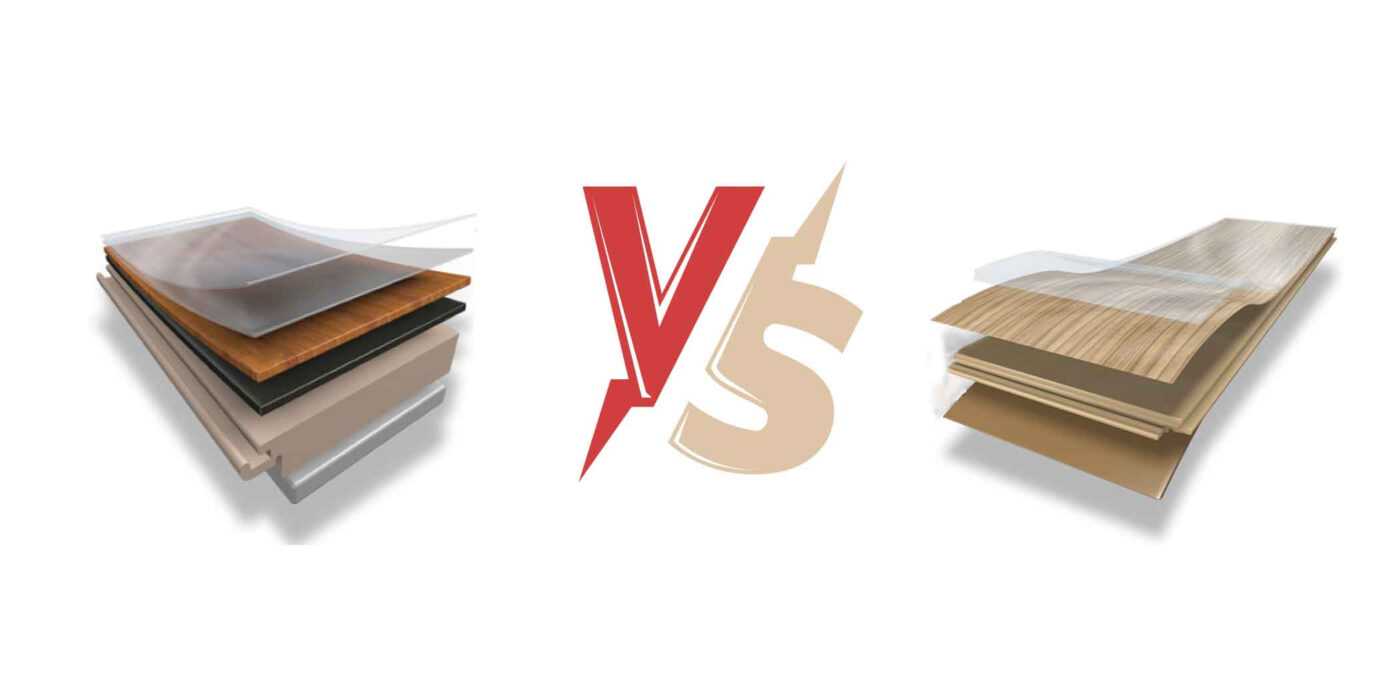
There are several differences between hybrid flooring and laminate flooring but the main ones are Water Resistance, Durability, Cost/ Price, Thickness.
Hybrid Flooring Vs. Engineered timber Flooring: Water Proofness
Being water-proof is the most important difference between hybrid flooring and engineered timber which makes hybrid flooring the first choice for wet areas as it is 100% waterproof.
Hybrid Flooring Vs. Engineered timber Flooring: Cost/ Price
Hybrid flooring is a more cost-effective option compared to engineered timber flooring. Normally the cost of installation of both is the same if the engineered timber flooring is also click system in opposed to tongue and groove. Most of the engineered timber floors in the market are tongue and groove which needs PVA glue during the installation process. This makes the installation process slower and dearer. Cost of labour installation of a tongue and groove engineered timber flooring is around $25-$30 per SQMs depends on the experience of the installer excluding the subfloor levelling and old floor removal. Browse Flooring 2U Special Sale maybe you can find your premium quality hybrid flooring or engineered flooring for a great price!
Hybrid Flooring Vs. Engineered timber Flooring: Durability
Durability is the next major factor that makes the hybrid flooring better compared to engineered timber flooring. As engineered timber flooring is a 100% natural product but hybrid flooring is made by man.
Hybrid Flooring Vs. Engineered timber Flooring: Thickness
Engineered timber flooring thickness varies from 12mm up to 21mm. Hybrid flooring, on the other hand, is much thinner normally 4mm-7mm. Thanks to new construction techniques as you do not need thick floor anymore as part of your house structure. All the new houses have a concrete slab that supports the whole subfloor and has made the flooring more a cosmetic element in the building. still, some traditional builders recommend their customers that thicker timber flooring is always a better option! In most of the renovation projects, there are restrictions due to the height of other building elements like existing floors, doors height, skirting boards height, etc. so making a right decision can really affect the cost of unseen issues during the installation even the look and safety of the completed floor! Browse our product to find the best hybrid flooring or engineered timber flooring for your project.
Hybrid Flooring VS. Engineered Timber Flooring
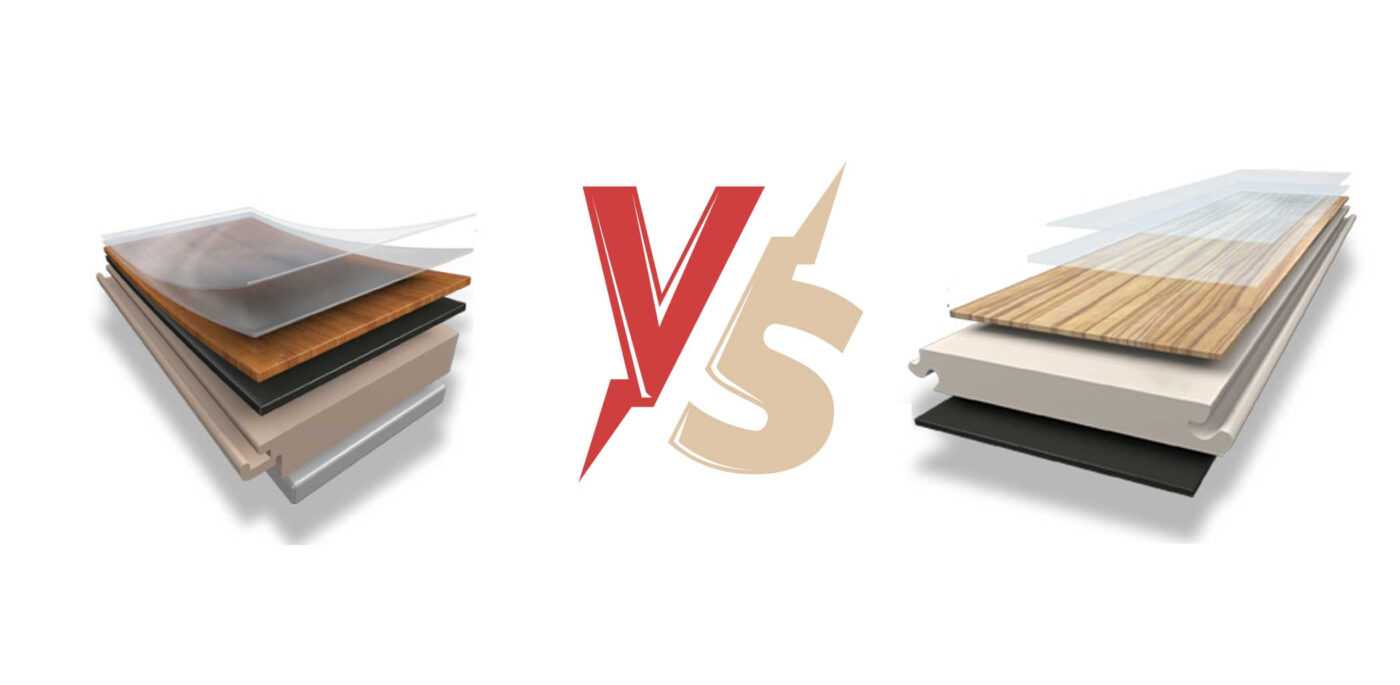
In this section, I am going to compare the major differences of Hybrid Flooring and Engineered Timber Flooring which are: Water Proofness, Premium Looking, Cost/ Price, Thickness, and Durability.
Hybrid Flooring Vs. Laminate Flooring: Water Resistance
Being water-resistant is the most important difference between hybrid flooring and laminate which makes hybrid flooring the first choice for wet areas as it is 100% waterproof.
Hybrid Flooring Vs. Laminate Flooring: Durability
Durability is the next major factor which makes the laminate flooring better than hybrid flooring due to its Aluminum Oxide wear layer.
Hybrid Flooring Vs. Laminate Flooring: Cost/ Price
Price is another important factor, especially in the investment properties which again makes laminate flooring a better option due to its better pricing compared to the hybrid. Normally cost of installation of both are the same. You just might need to spend a little bit extra on the laminate floor as it needs a better even subfloor compared to the hybrid option. Reason is due to the hybrid planks being more flexible compared to laminate boards it can take the shape of its subfloor if there is a minor unevenness!
Hybrid Flooring Vs. Laminate Flooring: Thickness
In a flooring project thickness of new floor is important as it would be better to have it flush or at least less difference against the existing tile or carpet in the bathroom, kitchen and beds and for apartments to not hit the entrance door which is a fire door and trimming it would not be the easiest thing to do. hybrid flooring core i.e. excluding underlay and wear layer starts from 4mm up to 7mm. At the moment the thickest hybrid flooring in Australia’s market is Australian Native Resiplank Hybrid Flooring which is 9.7mm thick including the underlay and the wear layer. Laminate flooring thickness, on the other hand, starts from 8mm up to 12 mm normally. But there is a 14mm laminate flooring made in Swiss called Krono Swiss Aquastop which is nearly waterproof for 72 hours!
Browse our product to find the best hybrid flooring or for your project.
Hybrid flooring vs Engineered Flooring

Hybrid flooring and engineered flooring are both types of flooring that are made of multiple layers. However, they have some key differences in terms of construction, performance, and appearance.
Construction:
Hybrid flooring is made up of a rigid core (typically made of PVC) that is topped with a realistic photographic image and a wear layer. Engineered flooring, on the other hand, is made up of a thin veneer of real hardwood on top of multiple layers of engineered wood.
Performance:
Hybrid flooring is more durable and resistant to moisture and scratches than traditional laminate flooring. Engineered flooring is also durable and can withstand moisture, but it is not as scratch-resistant as hybrid flooring. Engineered flooring is also more stable than solid hardwood flooring, meaning it is less likely to expand or contract due to changes in humidity.
Appearance:
Hybrid flooring has a more realistic wood-like appearance than traditional laminate flooring. Engineered flooring, on the other hand, has a real wood veneer on top that gives it a very similar appearance to solid hardwood flooring.
Cost:
Engineered flooring is typically more expensive than hybrid flooring.
Overall, hybrid flooring is a versatile and durable option that offers the look of hardwood or tile flooring at a more affordable price point. Engineered flooring is a good option if you want the appearance of hardwood flooring but with better stability and resistance to moisture. Both options have pros and cons depending on the needs, budget and preferences of the customer.
Building or renovating any place can be an exciting affair; but it is also riddled with myriad choices at every step. Picking a flooring type is one such choice, that goes beyond design, playing a larger functional role as well. With so many choices available it can get confusing to evaluate and pick the right one for your needs. Vinyl and hybrid are two very popular options today when it comes to water-resistant flooring. They even share similarities in design and are also affordable and durable compared to most other types. But this is really where most similarities end, as they are structured quite differently.
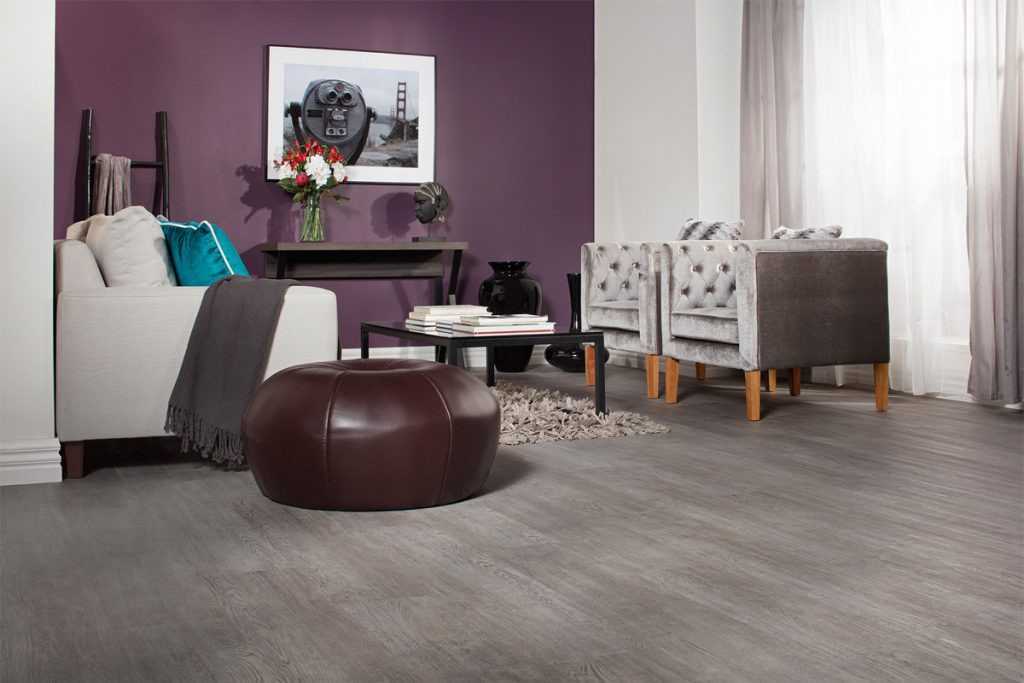
Hybrid Flooring
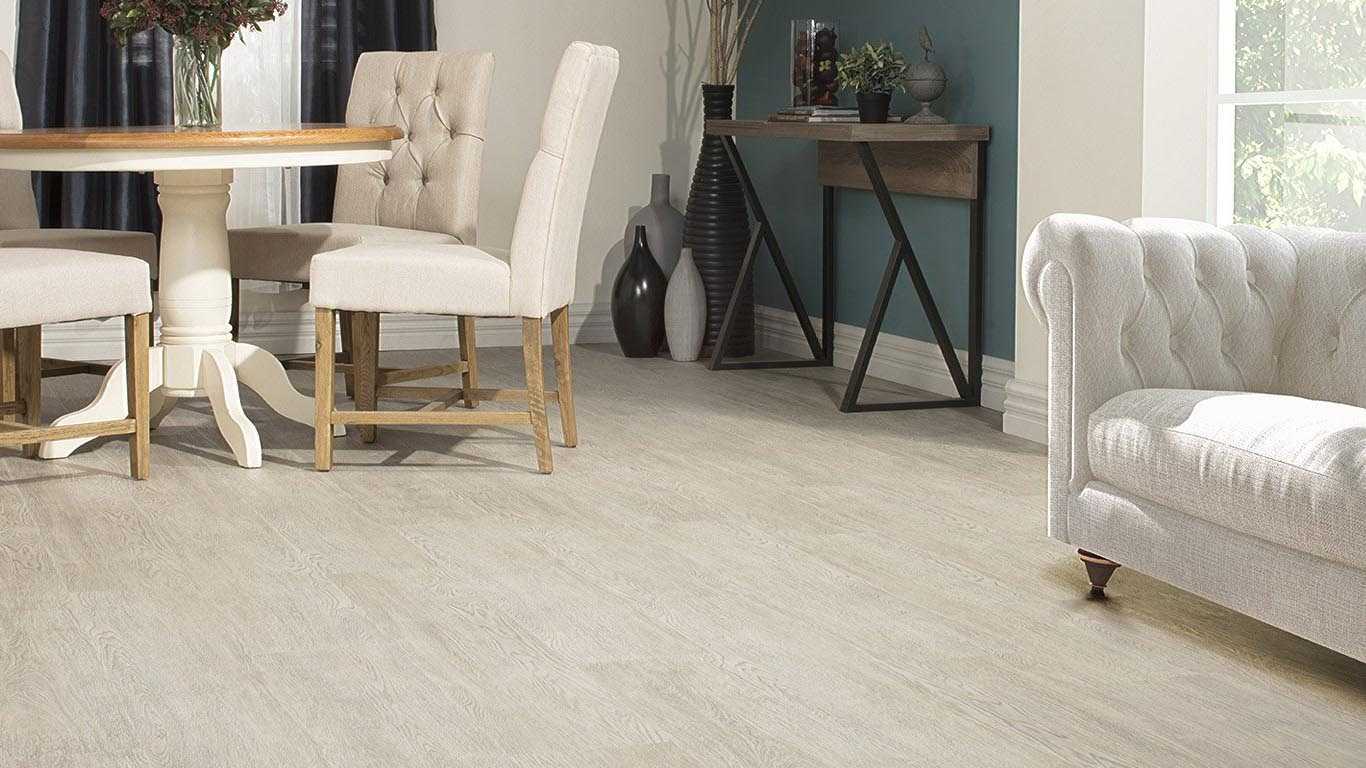
Vinyl Flooring
With this blog, we will help you dig deeper into what makes each of these flooring types unique, so that you can make an informed choice for your project.
The “Core” Difference between Hybrid and Vinyl Flooring!
While both vinyl planks and hybrid floors are multi-layered, their key difference lies in what makes up their core layer. In the case of vinyl, it is polyvinyl chloride, more commonly known as PVC that imparts structure and strength to the planks. When it comes to hybrid flooring, the core could be a composite of wood and plastic (WPC – Wood Plastic Composite), or stone and plastic (SPC – Stone Plastic Composite). This not only imparts more rigidity, but also makes it less susceptible to changes in external temperature, unlike vinyl planks which could expand or contract.
The Installation Process
This is another area where both these flooring types differ. Each flooring type is laid down differently. Usually, vinyl floors are installed using the ‘glue-down’ method, meaning, each plank is glued onto the subfloor with a Hart Set or Pressure Set Adhesive. Alternatively, it could also be installed using the ‘loose lay’ method, where only the edge planks are fastened down. While this requires some effort, they can be easily laid up all the way to the skirtings, negating the need for a Scotia.
Hybrid floors, on the other hand are usually installed using the ‘click-lock’ method, similar to the installation for laminate flooring. This adhesive-free method is simpler and can also be suitable for those who wish to go down the DIY route.
Cost Efficiency
Both hybrid and vinyl flooring are quite affordable as compared to timber or hardwood floors. In fact, they can imitate the look of these surfaces at a much smaller cost investment. However, one must also consider the fact that while vinyl flooring might be relatively cheaper than hybrid flooring, it does have a higher installation cost as the planks need to be glued down. Moreover, as both these floor types are quite durable and easy to maintain, they would be well worth the investment.
If budget is an important parameter for you, it would be a good idea to do a comparative analysis of the material and installation costs of both these options, before deciding on one.
Moisture Resistance
This is an important consideration, especially while choosing the flooring for high moisture places such as bathrooms and kitchens. Thankfully, both these flooring options are 100% waterproof, due to the use of PVC in their core. But this doesn’t mean that you cannot use them in any other areas, as they are both available in a multitude of designs that mimic the look of other surfaces, such as timber, stone and ceramic!
Durability
Both vinyl and hybrid flooring are made to last. They both feature a wear layer made from polyurethane PVC, which offers great scratch and stain resistance over long periods of time. This layer also offers protection from fading. The fact that they are both 100% waterproof also adds to their longevity. Both floors are also suited to withstand high foot traffic, and are both quite durable.
Having said this, hybrid floors do offer better impact resistance when it comes to dents from heavier loads, due to their stronger core. But otherwise, the difference between the two isn’t that noticeable.
Temperature Resistance
This is one parameter where hybrid floors have a clear edge over vinyl. This is because vinyl flooring is primarily made of PVC, it doesn’t offer great resistance to fluctuations in outside temperature. It tends to expand with a rise in temperature, and contract when the temperature drops. This can be largely minimized by using a Hard Set Adhesive during the installation process. Hybrid floors can withstand these temperature changes much better due to their limestone / wood composite core. And if you are anticipating major temperature fluctuations on a regular basis, then hybrid floors would be a better choice.
Design
Both vinyl and hybrid floors are available in a wide range of colours, designs and styles. They can provide a true-to-life hardwood appearance at a fraction of the original cost. At Flooring 2U, we offer 100+ designs for you to choose from, for both these types of flooring options.
Comfort
Both hybrid and vinyl flooring require an underlay – a foam padding that is laid down below the flooring. The main purpose of this underlay is to ensure that the subfloor surface is flat and even prior to installation. What this also does is offer more ‘give’ when stepped on, which increases the overall comfort.
However, if you are also concerned about acoustics, vinyl offers better sound absorption whereas hybrid flooring, being more rigid, tends to create more airborne noise. If you are looking for a soft, quieter space, vinyl would be the way to go. However, the same cannot be said in the case of multi-residential units, as vinyl would transfer the sound of the footfalls onto the floors below. Hybrid flooring, on the other hand, can better contain the sound due to its underlay.
Maintenance
If regular cleaning and maintenance is going to be needed, then it makes sense to choose a flooring type that isn’t too difficult. Thankfully, both vinyl and hybrid floors are quite a breeze to clean and maintain. Simply sweeping or vacuuming the floors and the occasional damp mopping works just fine in keeping them clean and dust-free. This is also what makes both these options ideal for high traffic foot areas and commercial spaces that require frequent and regular maintenance.
But even while they are easy to maintain, it won’t hurt to practice some other things such as using doormats to prevent dust from entering the space, cleaning up stains and spills as soon as they happen, and using non-abrasive cleaners for maintenance. With all this in place, you can expect your floors to stay good for years on end.
Repairs
When it comes to repairs however, vinyl flooring has the upper hand. Due to its ‘glue-down’ installation process, it is easier to replace any damaged planks without the need to remove any of the surrounding planks. This is not the case with hybrid flooring, as its click-lock installation requires that multiple boards be removed and re-laid, just to be able to reach and replace the damaged board. Of course, both these flooring options are designed to last, and might not even require repairs. But this is still a factor worth considering nonetheless.
A Quick Snapshot of Key Differences between Vinyl & Hybrid Flooring
If you’ve read this far, you certainly would like to see a quick roundup of all the things we’ve discussed so far, so that you can make an informed choice about what would be best for you.
The Final Verdict
As you would agree, both these flooring types offer comparable performance on most parameters, and therefore, there isn’t a clear winner overall. But the best way to choose the right type would require you to really evaluate your project needs, and future usage patterns, along with the overall budget. This can help you pick the one that is most suited for you.
If you’ve enjoyed reading this, and would like to explore any of these options for your flooring requirements, we invite you to connect with our in-house experts.
| Key Consideration | Vinyl Flooring | Hybrid Flooring |
|---|---|---|
| Structure | Multi-layered. Has PVC at its core, and a backing that allows for proper bonding to the subfloor. | Multi-layered. Has a composite of PVC with either limestone or wood, and an underlay. |
| Affordability | Very affordable. | A tad higher priced than vinyl flooring. |
| Installation | Not as easy. Loose lay or Glue Down on a subfloor. | Quite easy. Floating or click-lock installation. |
| Moisture Resistance | 100% moisture resistant. | 100% moisture resistant. |
| Durability | Can last for as long as 20 years with the right care. Comparatively less durable, could be damaged in case of heavy loads. | Quite durable and hard-wearing, can withstand heavy loads as well. Can last for as long as 25 years with good care. |
| Scratch Resistance | The topmost wear layer offers great protection from scratches and stains. | The topmost wear layer offers great protection from scratches and stains. |
| Temperature Resistance | Could expand / contract with changes in temperature. | More stable to temperature changes. |
| Design | Available in a wide range of designs and styles. | Available in a wide range of designs and styles. |
| Comfort | Soft, Flexible, and quite comfortable due to its glue-down installation. | The use of an underlay makes it quite comfortable. |
| Maintenance | Easy, hassle-free maintenance. | Easy, hassle-free maintenance. |
| Repairs | Easier to repair and replace damaged planks. | The click-lock installation makes it relatively less convenient for repairs. |
